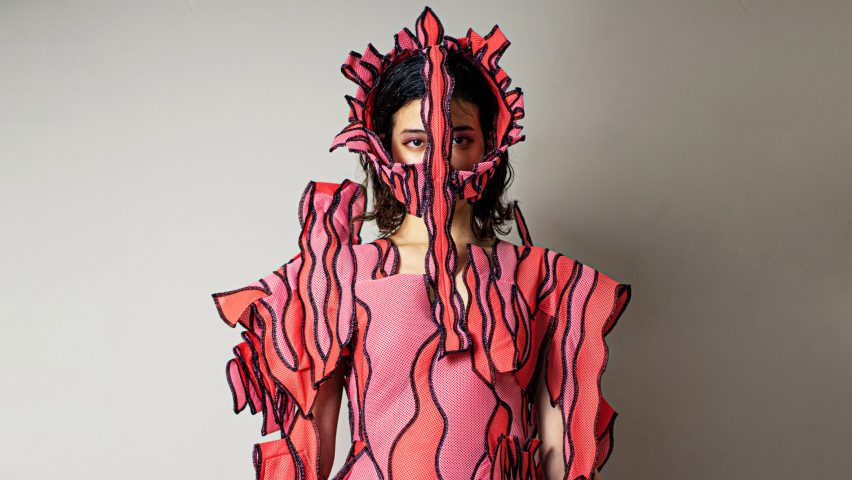Tokyo designer Ryunosuke Okazaki has created a collection of sculptural garments that reference the surrealist art method of automatism.
His eponymous Automatism collection showcases a series of eight garments that curve, fold and zigzag to create three-dimensional shapes and silhouettes.
Okazaki looked to automatist experiments by André Breton, the founder of the surrealist movement, when creating the abstract pieces.
Surrealist automatism is a method of creating art in which the artist suppresses conscious control over the process. It is named for a physiological term that describes bodily movements that aren't consciously controlled, such as breathing or sleepwalking.
"This collection is inspired by André Breton's Automatism, and surrealist paintings that are not bound by reason, common sense, or logical structure," Okazaki told Dezeen.
"This is an experiment that aims for new modelling beyond my imagination, by modelling from acts that are also not bound by reason, common sense, or logical structure."
Each look in the collection varies in shape and form but all are unified in their material use and construction technique.
Okazaki created the pieces by using double-layered mesh and organdy in a variety of different colours.
The designer explained that the abstract shapes and patterns were formed at the "mercy" of his sewing machine. He allowed the machine's overlock-stitch and automatic functions to take control of the fabric to produce flowing curves and zig-zag details.
"The shapes I create would change over time, like the human body changes," Okazaki said.
"The undulating curves created at the mercy of the sewing machine seem to engrave a certain rhythm despite the unintended modelling. "
Each garment boasts contrasting colour palettes, combining neon greens with bright reds and orange fabrics with green contrast stitching to create bold clashes.
Instead of sketching, the designer explained that he used repeated methods of experimentation through fabric and colour before finding something that worked.
"I'm always looking for colours I haven't used before because I don't want to fix the colour images of the brand," said Okazaki.
"It's work like my daily drawings and I always make it with an experimental spirit. I work while experimenting without drawing sketches. That's because I feel that drawing sketches limits my imagination," he added.
The Tokyo-based designer recently created a couture collection informed by Jōmon-era pottery for his graduate collection at the Tokyo University of the Arts.
Other surrealist works include Central Saint Martin's graduate Yasmina Atta's "shape-shifting" BA collection that an explores post-colonial African identity and Dahee Kim's collection that used bean bags to create back-attachments that double as impromptu chairs.

